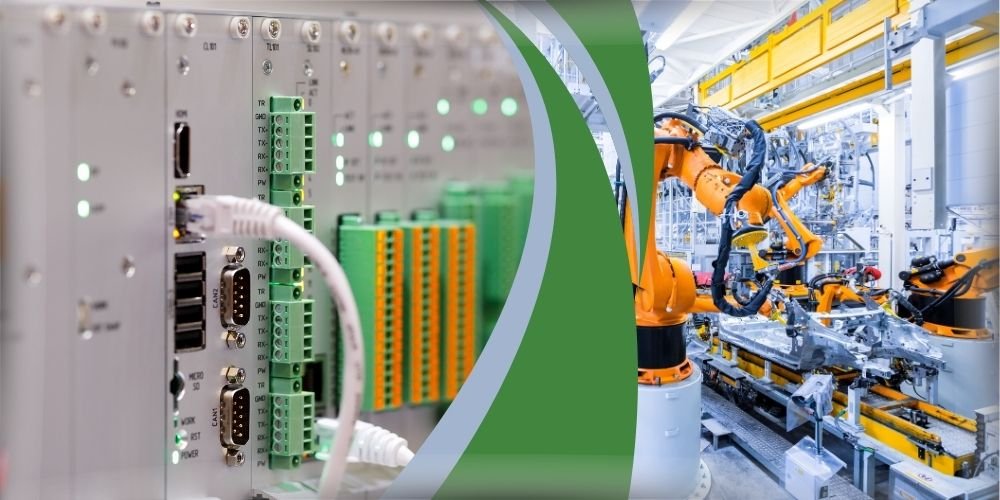Modular PLC A Flexible Approach to Industrial Automation
In the world of automation, selecting the right type of Programmable Logic Controller (PLC) is crucial for building efficient and scalable control systems. One of the most powerful and flexible options available today is the modular PLC. But what exactly is a modular PLC? How does it differ from a compact PLC? And why are more industries moving toward modular architectures? This guide answers all these questions with clarity and real-world examples. A modular PLC is a type of Programmable Logic Controller designed with a modular structure, where various functional components—such as the CPU, power supply, input/output (I/O) modules, and communication cards—are installed as separate units on a backplane or rail. This design allows for easy customization and scalability, making modular PLCs an ideal solution for complex or growing automation systems. These features make modular PLCs especially useful for large factories, production lines, and process industries where system requirements frequently change or expand. Understanding the difference between a modular PLC and a compact PLC is important for choosing the right automation solution. A compact PLC is best for small, fixed applications with fewer I/Os, while a modular PLC is preferred when flexibility and expansion are critical. Thanks to their adaptable nature, modular PLCs are used across a wide range of industrial environments: In each of these settings, system expansion or customization is often required—making modular PLCs the logical choice. Here’s why many automation engineers and system integrators prefer modular PLCs: Only add the modules you need—nothing more, nothing less. Tailor your PLC system to suit your exact application. Replace faulty modules without stopping the entire system, minimizing downtime and service disruptions. Easily expand your system by adding new I/O, communication, or functional modules as your plant grows. With dedicated modules handling different tasks, modular PLCs can deliver faster and more reliable performance. If your project involves: ...then a modular PLC is your best option. On the other hand, for simple machine control or fixed small-scale operations, a compact PLC might offer a more economical and space-saving solution. Some of the most reliable modular PLC manufacturers include: Working with trusted suppliers like Anadi Automation ensures that your modular PLC system is genuine, fully supported, and tailored to your needs. To sum it up, modular PLCs provide a flexible, scalable, and powerful solution for modern automation systems. While compact PLCs are perfect for smaller applications, modular systems shine in environments where adaptability and growth are priorities. Whether you’re upgrading your production line, expanding operations, or designing a new automation system from scratch, a modular PLC offers the performance, reliability, and customization your business demands. A modular PLC is a programmable logic controller system made up of individual, replaceable modules for CPU, I/O, power, and communication. Modular PLCs offer more flexibility and expansion options, while compact PLCs come as a single, all-in-one unit with limited scalability. Modular PLCs are used in automotive, food and beverage, pharmaceuticals, energy, water treatment, and any industry requiring flexible automation control. Yes, modular PLCs are highly compatible with SCADA and HMI systems for real-time data monitoring and control. They may have a higher initial cost than compact PLCs, but they offer long-term savings through scalability and reduced downtime.What Is a Modular PLC?
Key Features of Modular PLCs
1. Expandable Design: Add or remove modules based on system requirements.
2. High I/O Capacity: Easily manage large numbers of input and output signals.
3. Separation of Functions: Power supply, CPU, and I/O modules work independently but are interconnected.
4. Flexible Mounting Options: Rack or DIN rail mounting depending on space and configuration.
5. Easy Maintenance: Replace faulty modules without affecting the entire system.Modular PLC vs Compact PLC: What’s the Difference?
Feature Modular PLC Compact PLC Design All components housed in a single unit Scalability Highly scalable Limited scalability Maintenance Easier to replace/upgrade parts Whole unit may need replacement Cost Higher upfront cost More affordable for small applications Suitable For Large/complex systems Small-scale/simple automation tasks Applications of Modular PLCs in Industry
Benefits of Using Modular PLCs
✅ Custom Configuration
✅ Improved Maintenance
✅ Future Expansion
✅ Better Performance
When to Choose a Modular PLC Over a Compact PLC
Tips for Selecting the Right Modular PLC
Assess I/O Requirements – Calculate current and future input/output needs.
Evaluate Communication Needs – Ensure the PLC supports your required protocols.
Check Environmental Specs – Choose a PLC that suits your operating environment (temperature, humidity, vibration).
Consider Programming Flexibility – Look for a platform that supports standard languages like Ladder, Function Block, or Structured Text.
Think Long-Term – Go modular if scalability is important for your application.Modular PLC Brands You Can Trust
Siemens (S7-300, S7-1500 series)
Mitsubishi (iQ-R Series)
Schneider Electric (Modicon M340, M580)
Omron (CJ2 Series)
Yaskawa, ABB, Panasonic and moreConclusion: Modular PLCs Offer the Power to Scale Smartly
FAQs About Modular PLCs
Q1: What is a modular PLC?
Q2: How does a modular PLC differ from a compact PLC?
Q3: What industries use modular PLCs?
Q4: Can modular PLCs be used with SCADA systems?
Q5: Are modular PLCs expensive?
Related Blogs

